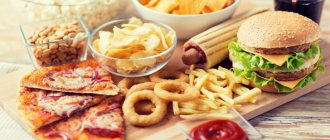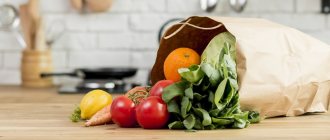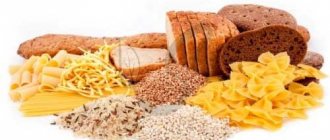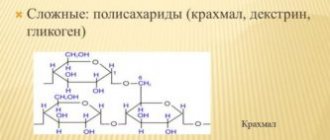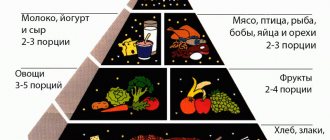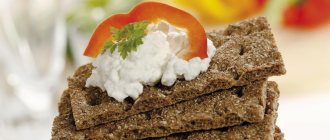Carbohydrates are a source of energy for the body. Physiologically, a person is designed in such a way that they are necessary for physical and mental activity. If there is an excess intake, their unspent balance can be converted into fat reserves.
With a constant deficiency, metabolic processes begin to be disrupted, but not all of them are equally useful.
The main carbohydrates in food are complex sugars called polysaccharides, which include glycogen and starch, consisting of several simple sugar units, and monosaccharides (glucose, fructose). There are two main types of carbohydrates:
- Fast (simple) carbohydrates. The rate of breakdown and absorption is higher.
- Slow (complex) carbohydrates have a complex structure, so more time is spent on absorption, and blood sugar levels remain constant, without sudden changes.
Slow
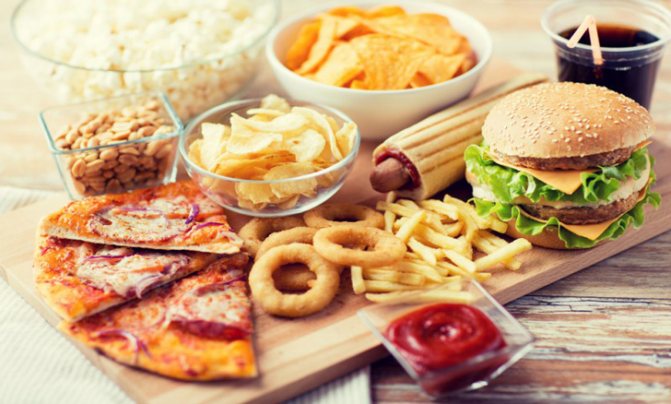
Good or slow carbohydrates are foods with a low glycemic index. Characteristics of this energy group:
- presence of vitamins, fiber and minerals
- chemical structure that speeds up metabolism
- prolonged digestion
- slow release of calories
The good ones, also known as complex compounds, are found in whole grains, unprocessed rice, cereals, nuts, seeds, vegetables and fruits.
How to improve digestion?
You can improve your digestion of food naturally by:
- Try to eat natural foods and limit your intake of processed foods.
- Minimize the amount of salt and food additives, as they negatively affect intestinal function.
- Introduce fiber foods into your diet. This substance acts as a natural toothbrush for the intestines and helps in the formation of feces.
- Include healthy fats in your diet. This has a positive effect on your well-being and makes going to the toilet easier.
- Drink more fluids, as lack of fluids often causes constipation.
- Control your stress level and do not deprive yourself of the opportunity to have a good rest and sleep.
- Try to eat consciously, and not out of idleness. Particularly harmful is the habit of “eating” negative emotions and stress.
- Chew food thoroughly.
Many internal organs are involved in the digestive process. This is a multifaceted process, so it is worth helping the body and monitoring the nutritional culture.
Fast
Bad or fast carbohydrates are a nutritional group with a high glycemic index and properties:
- digest very quickly
- cause fluctuations in blood sugar levels
- provoke a sharp release of insulin
- lead to the deposition of adipose tissue
Sources of fast or simple carbohydrates are foods that are pre-processed, lack fiber, and have low nutritional value.
Fast carbohydrates, list of products:
- pasta made from soft wheat varieties
- potatoes, white bread, pastries
- confectionery - cakes and desserts
- muesli, cereal, white rice, popcorn, sugar
- instant porridge and puree, honey
- yoghurts and curds with additives
- jam, chips, lemonades, sweet drinks, juices
A carbohydrate-balanced menu consists mainly of foods including:
- dark flour
- fruits and vegetables
In this case, the processes of lipogenesis - that is, the formation and deposition of fat in the body are under control.
Foods with easily digestible carbohydrates should be avoided:
- made from white flour
- semolina-type cereals
- with added sugar
Remember - simple carbohydrates are a calorie bomb devoid of nutrients.
Back to contents
How to properly consume herbal substances?
To prepare food that will contain a small amount of simple carbohydrates, you should give preference to boiled or baked foods. It is necessary to exclude fried foods and smoked foods from your diet. Vegetables in the diet should be fresh or steamed. Fish and meat are baked on the grill (or in the oven) or boiled.
This regimen and diet will help the body normalize the process of assimilation of organic nutrients. Thanks to this method of eating food, you can get rid of extra pounds, as well as normalize insulin levels in the blood.
A complete rejection of carbohydrates is strictly prohibited, otherwise you can harm the liver and kidneys, which will lead to a deterioration in a person’s overall health.
Choose only the right foods and be healthy!
Is it right to give up carbohydrate-containing foods?
Sometimes, people, in pursuit of good shape, decide to avoid eating any carbohydrates. But, this is a bad choice.
- Low-energy nutrition is of the ketogenic type. A lack of energy substances in the diet leads to the process of ketosis - fat burning, during which ketone substances enter the blood. These are toxins, in particular, depressing brain functions.
- In addition, the body increases the production of hormones - norepinephrine, adrenaline and glucagon. These compounds are useful in the short term, but on an ongoing basis lead to exhaustion of the body and endocrine disruption.
- Another unpleasant aspect of a low-carbohydrate diet is hypercholesterolemia with rapid vascular damage and the risk of conditions such as stroke or heart attack.
- Just 3-4 months of eating without plant fiber will cause gastrointestinal problems - vomiting, constipation or nausea. Additionally, a deficiency of vitamins B, C and A will form, the body will become acidic, the nervous system will become hyperactive, and the urinary system will react with gout.
- Separately, disorders of calcium phosphate, hemoglobin and glucose metabolism may develop. That is, a person will become acquainted with type 2 diabetes, osteoporosis or osteopenia.
Therefore, the right choice would be a healthy diet rich in slow carbohydrates.
Back to contents
Carbohydrate to Protein Ratio
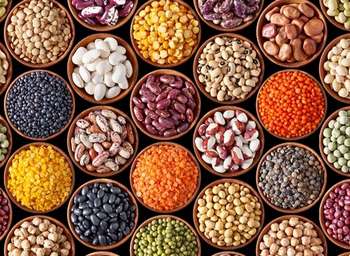
By reducing the amount of carbohydrates consumed and adhering to a dietary nutrition program, each person must include a certain amount of protein in their menu to balance all the beneficial substances.
Thanks to this, it is possible to prevent the consumption of nitrogen, the deficiency of which, in turn, leads to disruptions in the functioning of the muscular system or to a decrease in muscle mass. In addition, the body urgently needs excess protein, which, transformed in the liver into dextrose, is needed to ensure the normal functioning of the brain and central nervous system.
When and how to consume carbohydrate-containing foods?
There are general rules for consuming energy products.
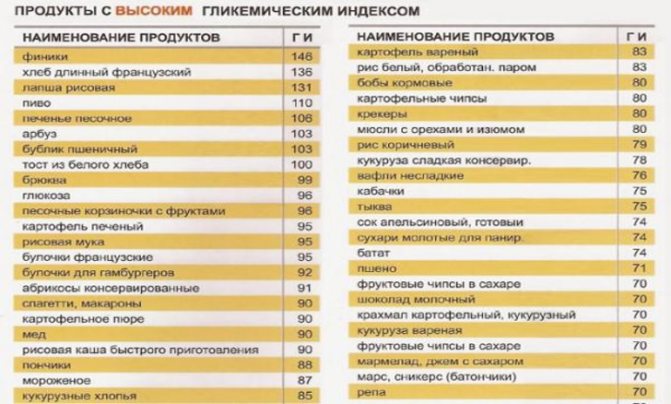
In the morning
You can use small amounts of fast carbohydrates, which will help your brain work intensively and will be a good way to start the day energetically. In the morning it is recommended:
- jam, marmalade or honey
- sweetened yoghurts
- cereal with dried fruits
And also, carbohydrates in porridges - semolina, millet, oatmeal with the addition of fruit.
Dinner
Must include complex carbohydrates:
- whole grain bread
- durum wheat pastes
- dark pasta and brown rice
In addition, fruits or vegetables in salads, side dishes and fresh.
Evening
Starting from 18-19 hours, it is recommended to eat only protein foods with the addition of lettuce or vegetables, except potatoes and legumes.
Depending on daily activity, when an energetic period is replaced by a measured period, it is necessary to reduce the amount of carbohydrates in the diet.
Back to contents
Types of carbohydrates.
There are fast and slow carbohydrates , their difference is in the speed of absorption. Slow ones should be taken before the start of training, so they will give off energy throughout the entire period of sports. And quick ones - after completing the training (within 30 minutes).
This pattern is due to our body’s need to restore resources that were spent during training. For example, glycogen is restored only by fast carbohydrates, and slow ones will take a long time to be absorbed, and the muscles do not receive the necessary component in a timely manner.
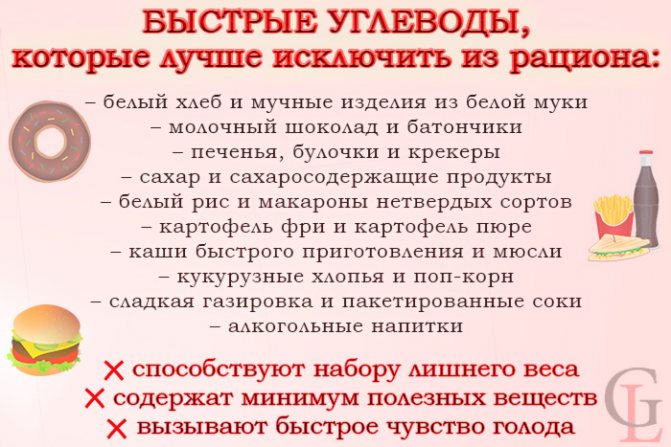
After the training process, a small dose of fast carbohydrates (100-150 g) will help you restore expended energy and awaken “hunger”. This portion is enough so that the process of converting sugar into fats does not activate, and if we then, when eating, saturate our diet with proteins, then the body will begin to use its own reserves - fats of the subcutaneous layer. This is roughly what ideal nutrition looks like during training days.
Why is sugar dangerous?
If we can say about slow carbohydrates that these are natural fruits and whole grains, then among fast carbohydrates the most useless carbohydrate is sugar. The product has no nutritional value and is considered the drug of the century for a number of reasons.
Sugar:
- Stimulates the formation of beta-endorphins.
- Gives the illusion of stress relief, briefly improving mood.
- It produces biochemical dependence in people.
- It affects the brain in a way similar to opioid intoxication because it stimulates the same receptors that respond to morphine, heroin and codeine.
After eating sweets, people feel calm. They quickly get used to the cake = happiness scheme. As a result, they become dependent.
Excess sugar, as the most prominent representative of bad carbohydrates, leads to:
- hypertension, irritability, hyperactivity
- decreased mental functions, cancer pathology
- suppression of the immune system, accelerated aging
- slowing down recovery processes
Not everyone consciously chooses to abuse simple carbohydrates. Therefore, it is useful to know where sugar is hidden in hidden form.
Back to contents
Alternative to white bread
White bread releases carbohydrates very quickly, causing a significant spike and subsequent drop in blood glucose levels. To maintain healthy blood glucose levels, try replacing white bread with one of the following low-GI breads:
- mixed grain - 34;
- rye sourdough - 48;
- rye - 50;
- soybeans and flaxseed - 50;
- wheat bread crumb - 54.
The following factors are important when trying to follow a healthy low GI diet:
Healthy foods with bad ingredients
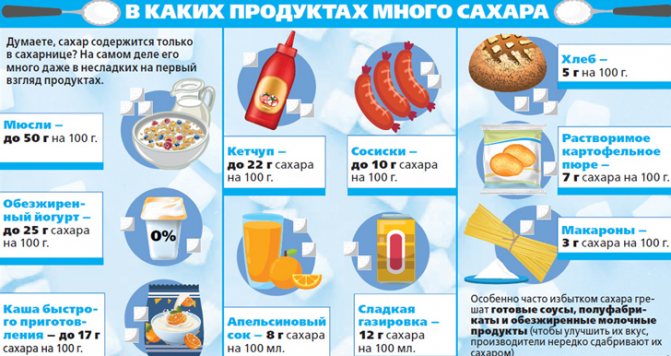
Diet cereals and candies are simply a trap for buyers, as they contain hefty doses of sugar. It's useful to know that this ingredient is also hidden in unsweetened foods:
- ketchup and salad sauces
- canned meat and fish
- peanut butter
- all types of bread
- yoghurts, muesli, cereal bars
- sausages and sausages
How can I find the information on the label? Read the section “Carbohydrates”, where the explanation “Including sugar” follows. On average, 150 grams of sugar-containing, although unsweetened, products contain up to 2 teaspoons of sugar. Healthy chocolate or cereal contains up to 3-5 spoons per 150 grams.
In conclusion, it is worth noting that nutritionists recommend paying attention not only to the amount of carbohydrates, but also to the presence of fats in foods, since the combination of sugar and fat has a particularly adverse effect on the health of the body.
Back to contents
Useful properties of rice
Rice is an important source of several B vitamins: thiamine B1, riboflavin B2, niacin B3 and B6; vitamin PP, carotene, vitamin E, which help strengthen the nervous system and have a beneficial effect on the condition of the skin, hair and nails. Rice contains a sufficient amount of microelements necessary for our body: potassium, phosphorus, zinc, iron, calcium, iodine and selenium. Rice contains complex carbohydrates, so rice is nutritious, but not high in calories and, on the contrary, promotes overall weight loss.
Rice contains 8 amino acids that are required by the human body to create new cells. Rice grains consist of 7-8% proteins. It is important that rice, unlike other grains, does not contain gluten, a plant protein that causes an allergic reaction. In addition, it contains lecithin, a known brain activator, an oligosaccharide that restores the intestines, and gamma-aminobutyric acid, which helps stabilize blood pressure. Rice contains a lot of potassium. This mineral neutralizes the effect on the body of salt that enters the body with other foods. Rice also contains small amounts of phosphorus, zinc, iron, calcium and iodine.
Rice is very useful for people who are trying not to gain excess weight, or even lose weight, since it does not stimulate gastric secretion and contains almost no salt. Many nutritionists advise having rice fasting days. However, you should be careful and have a sense of proportion when eating rice, since rice contains too little sodium, which is what retains fluid in the body.
Rice, especially unrefined rice, contains a whole cocktail of active substances, making it an ideal means for removing excess moisture and toxins from the body. Rice contains a lot of valuable vitamins, minerals and microelements, such as, for example, potassium, which takes a lot of water from the fatty tissue of our body. In addition, rice consists of 50% starch, which is easily digestible and is an excellent source of energy. And one more thing: Rice contains few calories and many ballast substances that stimulate the digestive system.
The best variety for removing toxins from the body is brown, brown rice. Of course, sometimes you can use white refined (long grain) rice for variety.
It is important not to put salt in rice dishes, as salt binds water and retains it in the body. Especially important: drink a lot
Every day you should drink at least 2 liters of mineral water and an additional 3 cups of herbal tea, such as nettle, birch leaves or juniper berries. These types of tea also remove toxins and water from the body.
The beneficial substances of rice also include its considerable content of complex carbohydrates (starch), which is why rice is so nutritious, but not heavy on the stomach. Rice also contains a lot of potassium and selenium. Rice contains vitamin PP, carotene, vitamin E.
The more processed the rice grain, the less vitamins and minerals it contains. The germ of the new plant and the white rice grain containing starch are hidden under a layer of brownish bran shell, which contains most of the vitamins, minerals and other nutrients. The bran membrane is protected by a hard yellow husk. All together is a grain of unhulled rice.
